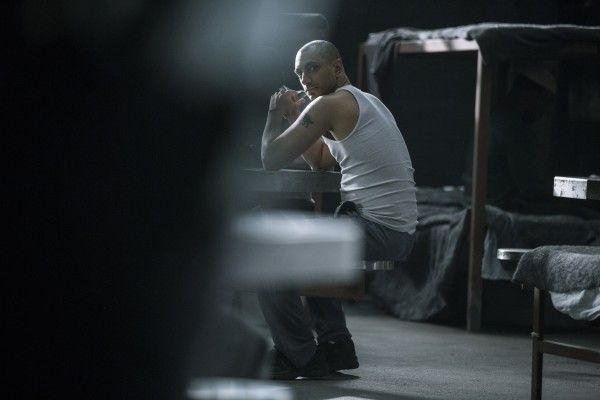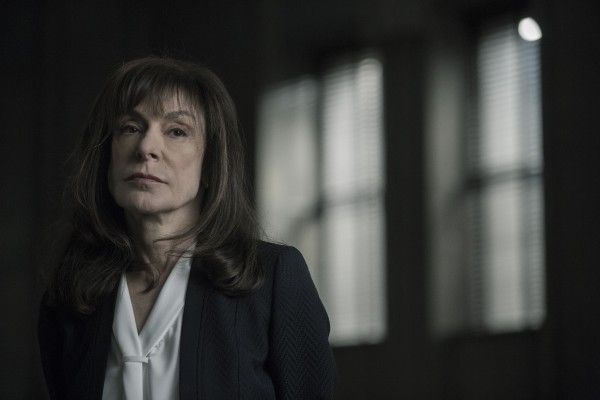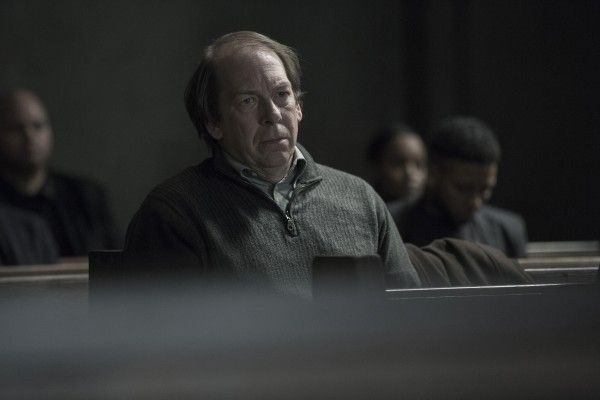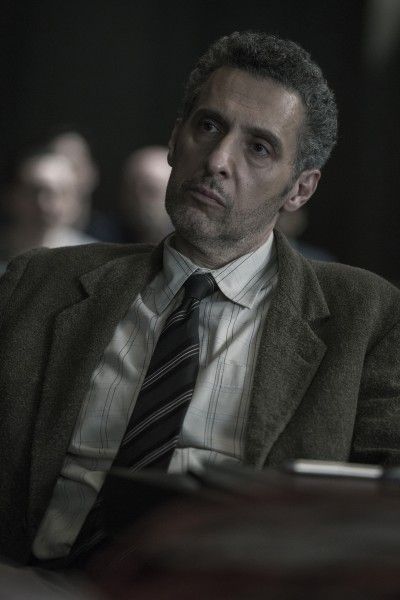Last week, I wrote that the killer’s identity on The Night Of didn’t matter. Last night’s finale proved that point by introducing a new suspect in the middle of the episode and pointing the finger at him decisively. And yet, the fact that The Night Of even tried to engage in the whodunit at the end when that wasn’t really the series’ focus was one of the reasons last night’s series finale only elicited a shrug.
What showrunners Richard Price and Steve Zaillian (the later of whom did an outstanding job directing the series) attempted to do with The Night Of was show the indifferent, broken machinery that churns people through the justice system. This was at odds with their attempt to lure people into a whodunit. If they wanted to show that the system was totally broken, they could have made Naz’s innocence unimpeachable, but then it would just be “The Wrong Man” story. It wouldn’t be a problem with the system; it would be a problem with this one case. It was not necessarily important to prove Naz innocent, but to show that with enough suspicion, an innocent man can be chewed up by the system.
But to keep viewers guessing, Price and Zaillian kept throwing little hints at the audience that Naz wasn’t, to quote the D.A.’s chalkboard, a “good boy”. He pushed a classmate down a flight of stairs. He got a false prescription for Adderall and sold it at a huge markup to his friends. There was a bit of darkness in Naz (as there is in all of us), and the show wanted us to wonder if there was enough darkness for him to commit a brutal murder in a drug-induced haze. But considering that Naz woke up without a drop of blood on him after supposedly stabbing someone 22 times, he never seemed to be a likely suspect.
For some viewers, the question of Naz’s guilt or innocence is the crux of the story, but it’s always been secondary. In fact, the true killer behind Andrea Cornish’s murder has always been secondary, and the finale, “The Call of the Wild”, proved that when it decided to point the finger at Andrea’s financial advisor, Ray Halle (Paulo Costanzo), and then broke out new evidence like his gambling, past confrontations with Andrea, and his movements on the night of the murder.
And in trying to bridge the gap between the secondary whodunit (and while the evidence against Ray is far from definitive, the fact that the show would even make the effort seems to make him the prime suspect) and a show about the indifferent machinations of the criminal justice system, The Night Of got swallowed up in the gulf between the two.
For a whodunit to function, it needs to assume that we live in a just world where the culprit will be found. It encourages us to play detective, we put together clues, and then we find the correct killer thus making the world a fair and just place. However, what The Night Of has done for the past seven episodes is show a system that’s anything but just. It’s a system built on getting convictions, and even if it doesn’t get those convictions, prison will change a person, and not for the better.
The best moment of the finale is the conversation between Box (Bill Camp) and Helen (Jeannie Berlin) where he lays out the case against Ray, and she simply says that they have a better shot at Naz. That doesn’t make her a corrupt person. It makes her a good prosecutor. She’s absolutely right that the preponderance of evidence is stronger against Naz, who they know was at the scene of the crime. Since the show has established that the system runs on convictions rather than finding the truth, Helen is in the right.
So when Helen decides not to continue prosecuting Naz after the hung jury (a perfectly just outcome in a series that has repeatedly eschewed notions of justice), it rings false. It gets worse when she teams up with Box to go after Ray. For a show that has clearly prided itself on unflinching honesty at depicting the criminal justice system, the notion that a prosecutor and a retired detective are going to go after a new suspect smacks of bullshit.
We’re meant to believe that the best way to go after Ray is that a guy who no longer has the backing of the police department will somehow collect evidence to be used against Ray in a court of law. That’s borderline vigilantism, and if Helen’s job is to get conviction, who’s a better target: the poor Muslim kid with the prison tattoos who has a huge amount of evidence stacked against him or the rich white guy who can afford a better attorney than Naz ever could?
Some may say that what happened to Naz was still an injustice. Even though he escaped further prosecution, the series left him a lonely drug addict, but that’s letting him off the hook a bit. At no point in prison was Naz forced to take drugs or get tattoos or take on a prison lifestyle. If anything, Naz had an unusual time because Freddy (Michael Kenneth Williams) protected him, and while he had to do some unsavory things, at no point was he forced to smoke crack or get tattoos. If anything, Naz assumed a prison lifestyle at a surprisingly fast rate (the show only takes place over the course of four months), and while his final circumstances are pitiable, they’re also the result of his choices.
Also, in an ultimate display of “save the cat” screenwriting, the cat literally gets saved at the end. In an oddly sweet grace note, the show celebrates folks like John Stone (John Turturro), who has gone right back to serving his guilty clientele, but now accepts his station in life as a man with skin problems and with a cat that represents lost causes. He’s doing the right thing in the face of a broken system, but as “The Call of the Wild” tried to argue, the system isn’t broken. Juries will come to the right decision (a hung jury was the correct decision based on the evidence, or lack thereof), prosecutors will doggedly go after a new suspect with the help of an old cop, and the John Stones of the world will continue to work for a flat fee.
For its first seven episodes, The Night Of was mostly a successful look at the strengths and weaknesses of our criminal justice system. There were some missteps (especially with the poor handling of Chandra (Amara Karan)), but it was mostly a thoughtful procedural that put an emphasis on procedure. “The Call of the Wild” is where the series flinched, and tried to reassure us of a just world, undermining its case, and leaving us not appalled but indifferent.





